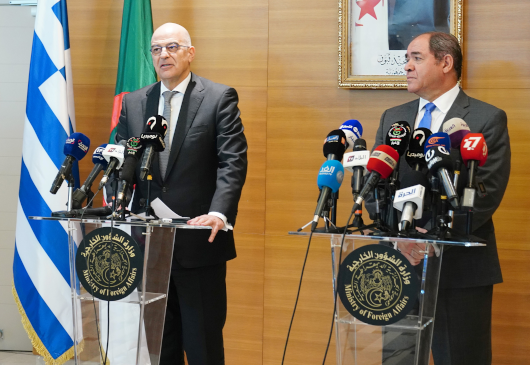 N. DENDIAS: Thank you Sabri, thank you dear colleague. It was a great pleasure to be here in Algiers today.
N. DENDIAS: Thank you Sabri, thank you dear colleague. It was a great pleasure to be here in Algiers today.
We had an exchange of views with my colleague, first of all on our bilateral relations, which are in very good order, but there is room for improvement and we will be working for this in the future.
Also, we shared our thoughts on regional issues on the Mediterranean and of course, as you may expect, the situation in Libya.
The situation in Libya is indeed of great concern to both our countries. Both Greece and Algeria believe there should be an immediate stop to hostilities and to any foreign intervention in Libya.
However, the memoranda signed between Mr. Sarraj and Turkey move to the opposite direction. This fuels the conflict, also with the constant flow of military equipment and mercenaries and creates a huge problem in the countries of the region, in the countries of the Mediterranean.
This behavior constitutes a blatant violation of the relevant UN Security Council resolutions.
They pose further obstacles to the efforts of the UN Security Council and of the Special Representative Mr. Salame, but also to the ongoing efforts of the international community, namely the Berlin Process. Efforts that Greece supported from the beginning. And, I have to say that, Greece supports any effort that moves in the direction of stabilizing the situation, stopping foreign interventions and creating a functioning country and society in Libya.
As regards the memorandum of the delimitation of maritime zones, I would like to reiterate that it is null and void, entirely outside the scope of International Law and produces no effect whatsoever.
I was very interested in listening the remarks of my colleague on the fact that no entity in Libya nowadays can claim legitimacy on being able to sign accords, agreements or represent the Libyan people.
Greece, a pillar of stability in the Eastern Mediterranean, and a country with special interests in developments in Libya, remains ready to support every effort towards a political solution to the Libyan conflict.
In this regard, as well as many others, we agreed with my colleague today to remain in contact and continue exchanging views for the benefit of peace and stability in our common region.
Dear Sabri, thank you very much for hosting us here today.
JOURNALIST: […] how do you see the role of Algeria in Libya?
N. DENDIAS: First of all, the reason of my visit is to enhance bilateral relations. We are friendly countries, there is not one bilateral problem that we have to resolve between us. But we can always improve, we can do more together. We are sharing a neighbourhood; we are both countries of the Mediterranean and this is our neighbourhood and our common future.
But, on the other hand, I wanted to also discuss with my colleague the situation in Libya, in order to understand and be educated on the Algerian position on Libya. And I have to say that I was very happy with what I heard. Because I heard that Algeria is working towards the creation of a stable society in Libya, a functioning society, a functioning state, and also, that Algeria is against any foreign military intervention in the region. Really, for Algeria, this is “a red line”. So, this is music to our ears, this is how we think countries should function, this, I think, is the rule that should be applied in our region.
Thank you.
February 13, 2020


